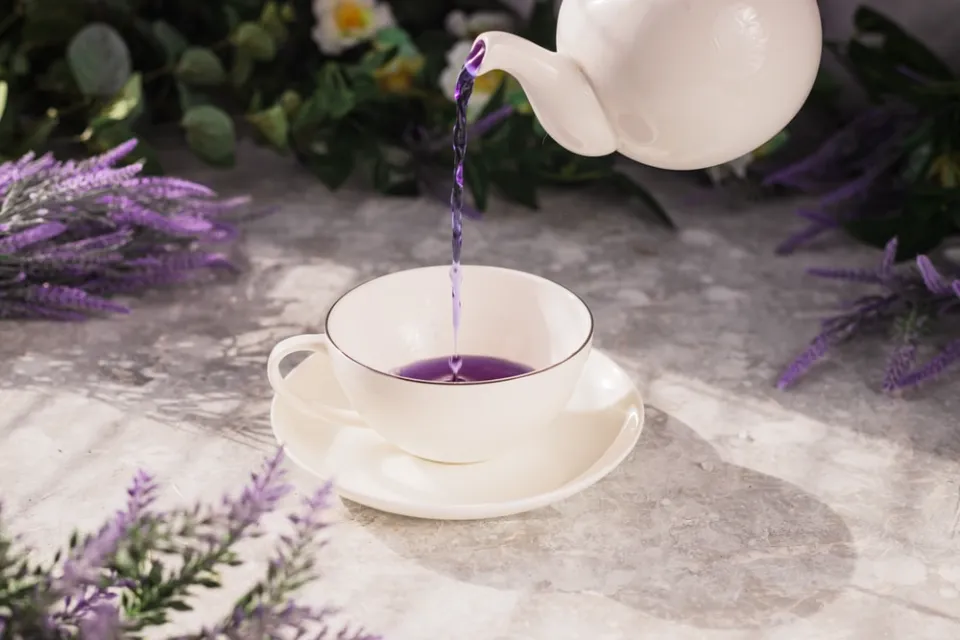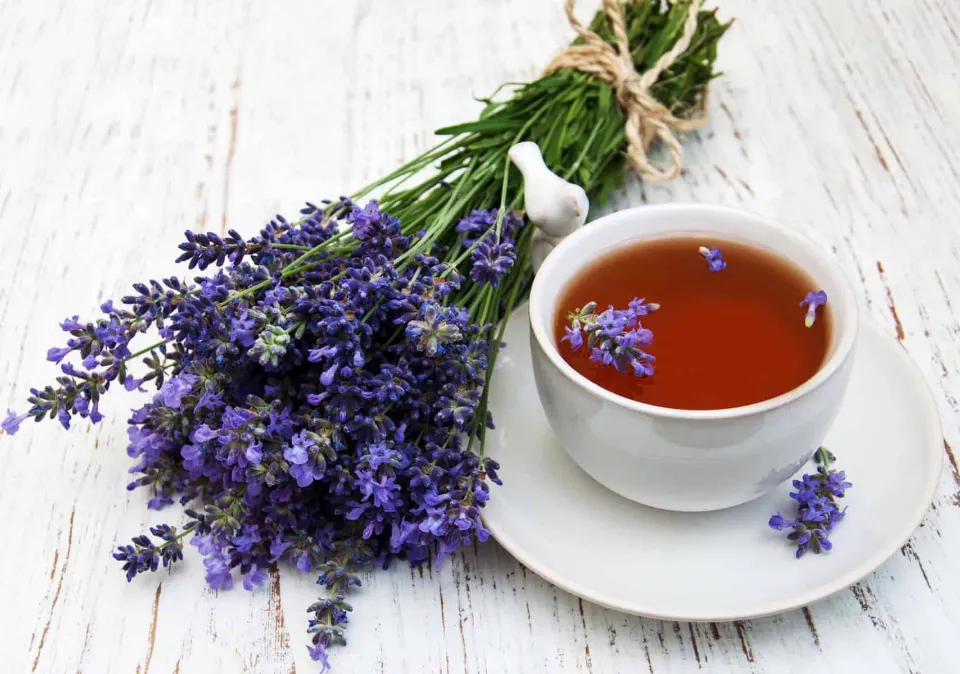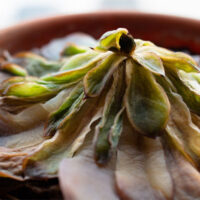A herbal beverage made from dried lavender flower buds is called lavender tea. What is lavender tea good for? 11 surprising benefits have been outlined in the following.
Lavender tea is lush stuff. In addition to being incredibly flavorful, caffeine-free, and aromatic, it also has a ton of health benefits.
This tea is thought to calm nerves, lead to better sleep, improve skin health, and provide many other benefits, though research is scarce and mostly focuses on lavender extracts.
Now that you know all the health benefits of drinking lavender tea, it’s time to make a delicious cup of the fragrant stuff.
Table of Contents
What is Lavender Tea?
Lavender tea is an herbal tea (also known as a tisane) made by steeping dried lavender flower buds in water. It is a drink devoid of caffeine.
There are over 40 species of lavender and the English and French species are the most commonly used to make lavender tea.
Lavender’s purple flowers and buds produce a drink with a faint purple tint.
Always use food-grade lavender to make sure they weren’t treated with pesticides.
Read More: When Does Lavender Bloom?
What is Lavender Tea Good For? 11 Benefits

As we explore the pleasures of drinking lavender tea, remember to sleep soundly, maintain a flushed and bright complexion, and tell anxiety to leave.
While more research is required on the consumption of lavender in tea, a great deal of research has been done on the therapeutic benefits of lavender as an aromatic healer. As a result, even making a cup of tea and allowing the steam to rise can do wonders for your overall wellness.
1. Lavender Tea for Better Sleep
Curl up before bed with a cup of calming lavender tea to reduce stress and promote restful sleep. Lavender has been used to treat sleep disorders for a long time because the fragrant herb encourages a reaction in your nervous system, which helps to calm brain activity. One study showed that new mothers in postpartum enjoyed better sleep quality when inhaling lavender fragrance 4 days a week for 8 weeks. Lavender is regarded as one of the best de-stressing teas, despite the fact that there are many others.
2. Lavender Tea for Menstrual Pain Medicine
For all those who find themselves curled up into a tight ball every month and fighting through cramps and period discomfort, lavender can be your knight in shining armor. This calming sweet herb lessens muscle spasms, calms the body, and reduces inflammation—all fantastic qualities for someone who is in pain.
Studies have shown that young women who inhaled the scent of lavender for 30 minutes each day for the first three days of their cycle felt less pain than the control group. Put the kettle on the next time your cycle is due.
3. Protect Skin from Fungal Infection
There’s a reason that lavender oil is so commonly used in skincare products as the healing potency of this plant brings a bounty of health to your skin. The anti-inflammatory and anti-fungal properties of lavender have been demonstrated to be fantastic for promoting skin healing and keeping you flush with health.
This is why you always see lavender in the active ingredients list for products aimed at acne, psoriasis, and other fragile skin conditions that need a gentle healing hand.
4. Lavender Tea for Balancing the Immune System
Lavender is one of many fantastic teas that are popularly known for boosting both immunity and energy. Lavender’s anti-inflammatory and antioxidant properties combine to make it a hugely advantageous substance for your immune system. Keeping your immune system healthy and working to the best of its ability is a surefire way of cutting down on your risks of catching illnesses and being at the top of your health game. The body can ward off various infections thanks to the abundance of vitamin C, magnesium, calcium, and other nutrients that are said to be present in lavender tea.
5. Lavender Tea as An Anxiety Remover

None of the aromas in the world can soothe the senses and lead you back to glorious grounding like lavender. Drinking lavender tea as an older adult can help to reduce the signs and feelings of stress and anxiety, according to a random clinical trial study done in 2020. A calm demeanor and a good mood are said to be communicated by lavender by stimulating activity in specific regions of the brain.
6. Supports Digestive System
As you relax and enjoy a soothing cup of lavender tea, get your digestive system in shape. Whether you are dealing with bloating, nausea, stomach upset, indigestion, or cramps, lavender tea can calm the body, lessen muscle spasms, and use that same antispasmodic magic to lessen uncomfortable gas and streamline your system. The smell of lavender is thought to stimulate the production of bile, which can aid in digestion and help the body release tension. Due to the chemical reaction that nausea causes in the brain, the same calming effect can also help with nausea. Lavender herbal tea can help you get back on track if any digestive problems are ruining your day.
7. Lavender Tea for Improving Respiratory Health
Before slinging back your lavender tea, take a deep breath and let the bright and springlike aroma open all your airways. Lavender can provide a small helping hand in making life more comfortable for those who struggle with breathing issues. When the muscles in your chest and throat are subjected to the antimicrobial and anti-inflammatory properties, it becomes easier to breathe and any bacteria that might be causing chesty colds, coughs, and congestion are effectively dealt with.
8. Lavender Tea for Wound Healing
The healing properties of lavender can be used to treat cuts, burns, and various skin blemishes and wounds. This fragrant flower can aid in the skin’s collagen production, which promotes healing. A study on animals revealed that applying lavender oil topically for 14 days significantly reduced the size of the wound.
9. Lavender Tea for Promoting Hair Growth
While more studies are needed to truly nail down these results, preliminary findings have led us to believe that lavender can help your hair to grow. For those suffering from hair loss or anyone who craves long and luscious locks, the results of lavender oil in hair growth and animal studies nod towards potential success.
10. May Improve Skin Health
Studies have demonstrated the anti-inflammatory and antibacterial properties of lavender oil.
Due to this, it is applied topically to treat wounds and abrasions as well as inflammatory skin conditions like psoriasis and acne.
According to one rat study, applying lavender oil topically every other day for 14 days significantly reduced the area of wounds compared to the control group. This is mainly because lavender oil promoted the synthesis of the structural protein collagen (10Trusted Source).
These results suggest that certain forms of lavender may promote skin healing and collagen formation.
11. Lavender Tea for Relieving Pain and Migraines
As lavender gets to work on reducing pain in the body, this also means it can play an important role in helping reduce headaches, muscle pain, backache, and any other issues you have going on.
Lavender consistently performed admirably in trials and tests and was found to be extremely helpful in relieving a throbbing head. Essential oils have long been used to help treat headaches naturally.
Side Effects of Lavender Tea
Lavender is considered to be generally safe and side effect free but as with all wild things, there are some people who may be susceptible to the effects of this tea.
Both young prepubescent boys and pregnant women may experience hormonal effects from lavender. When someone stops drinking lavender tea, it can encourage the growth of breast tissue in boys, which will be reversed. It has also been linked to mimicking the estrogen hormone so pregnant women may want to check with their medical professional first.
Lavender tea should not be consumed by anyone who is allergic to lavender flowers because it may cause a rash, throat irritation, or breathing problems.
Tips for How to Brew Lavender Tea
You can make lavender tea with loose flowers or tea bags. Fresh from your garden or dried for longer shelf life, the flower buds are both acceptable.
We always advise avoiding tea bags in favor of loose tea blends. In comparison to tea bags, loose teas have a fresher flavor and typically have better-quality flowers and buds.
When making lavender tea with garden flowers, there are a few considerations to make. To avoid contaminating them with harsh fertilizers and chemicals, it is best to cultivate them using organic methods.
These chemicals can find their way into your tea and cause negative side effects. Growing lavender flowers away from busy streets and other potential environmental irritants is also a good idea.
Wrap Up: What is Lavender Tea Good For
Lavender tea and extracts may help promote sleep, skin health, boost mood, and soothe anxiety.
For centuries healers have been turning to lavender and even to this very day, we often use this floral friend in skincare tonics, beauty products, and aromatherapy. Prepare to relax all of your senses with the help of lavender tea.
Nevertheless, savoring a cup of lavender tea can be relaxing and soothing.
Related Post:
FAQs
Is It OK to Drink Lavender Tea Everyday?
Lavender tea is generally safe for most adults if consumed in moderation. However, if you drink too much of it, you may experience headaches, constipation, and an increased appetite.
What Does Lavender Tea Taste Like?
With a faint minty undertone, the flavor is primarily floral. If you don’t add enough lavender buds, it tastes light and fresh.
Is There Caffeine in Lavender Tea?
When lavender buds are the only ingredient, lavender tea contains zero caffeine. Given that it won’t keep you up, it’s a great drink for the evening.
Who Should Not Drink Lavender Tea?
You should also think about consulting a doctor before drinking lavender tea if you have heart conditions or take medications because of its potential impact on the nervous system.

















